Svengalis & thugs: How rock managers take care of business
04 August 2016
Behind every successful singer or band there’s a manager. Often shadowy, sometimes violent, always dedicated – to making money. And not always for their clients. Shining a light on the most colourful of these boosters and shysters, with producers and PR men to follow in later episodes, the BBC Four series Music Moguls returns for a repeat broadcast. Here ALASTAIR McKAY considers the changing role of the manager, from Elvis’ handler Col Tom Parker to Justin Bieber’s boss, Scooter Braun. And, in an exclusive BBC Arts film, Creation Records’ Alan McGee and Bobby Gillespie recall riotous times.
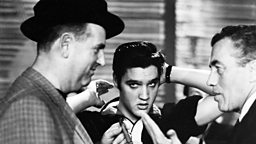
Although he was responsible for perhaps the biggest act in music history, Colonel Tom Parker left a small footprint. Search for examples of his wit and wisdom, and almost nothing appears, apart from a couple of quotes which he may or may not have uttered.
One is a piece of straightforward tactical advice: “Either operate from a position of advantage, or do not operate.”

Either operate from a position of advantage, or do not operateColonel Tom Parker
Quote two is straightforwardly commercial. “Don’t try to explain it, just sell it.”
The Colonel, who wasn’t a colonel and wasn’t called Tom, certainly followed the second maxim, both for his own myth, and that of his client, Elvis Presley.
Parker had learned his trade at the carnival and knew that, in the business of cheap thrills, there was no guarantee of a long career.
Just as he had made money by forcing a chicken to dance on a hotplate, he milked Elvis, fearful that rock would prove to be a fad.
Television appearances were limited, and interviews were almost non-existent. By attempting to explain himself, the youthful Presley could only have undermined his audience’s romantic fantasies.
Ultimately, Presley’s career was shaped by his manager’s foibles, and while it was lucrative, it did little to challenge Elvis artistically.
The singer’s movie career effectively neutered him as a musician. His later incarnation, as a Vegas lounge act, was designed to service Parker’s gambling habit.
Perhaps the biggest artificial restraint on Presley’s global career was Parker’s status as an illegal immigrant. He feared leaving the United States, so Presley was forced to stay home too.
Even then, Parker made a virtue of necessity, pioneering global satellite broadcasting with the 1973 telecast Aloha From Hawaii, which aired in 40 countries.
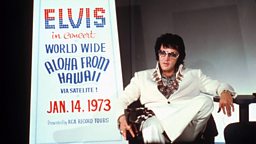
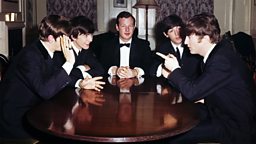
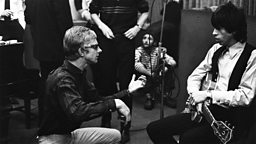
The Colonel spawned several imitators whose foibles are examined in the BBC Four documentary, Music Moguls: Moneymakers.
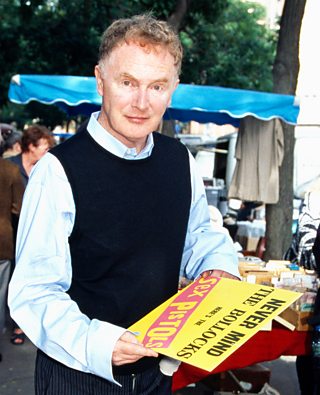
Who was Svengali? Sounds like some kind of Transylvanian CountGlen Matlock of The Sex Pistols
If Parker is the blueprint, the rock managers are more or less Machiavellian, and adapt their methods to suit their era.
As Sex Pistols’ bassist Glen Matlock says (reflecting on his time under the tutelage of Situationist prankster Malcolm McLaren): “Who was Svengali? Sounds like some kind of Transylvanian Count.”
Had Presley ventured abroad, there might have been no need for Larry Parnes, who dealt in facsimile, reworking US hits for the UK market, via a stable of manufactured stars with descriptive names.
After early success with Tommy Steele, he launched Marty Wilde, Billy Fury, Vince Eager, Duffy Power and Johnny Gentle.
“I always felt sorry for Johnny Gentle,” notes DJ Bob Harris in Music Moguls. After Parnes came Brian Epstein, the Beatles’ manager.
He was, notes Simon Napier-Bell in his book Ta-Ra-Ra-Boom-De-Ay, “surprisingly similar to Larry Parnes - provincial, Jewish, homosexual and a shopkeeper.”
He was also persistent in the pursuit of the deal, and tidied the Beatles up.
BBC Arts Exclusive: Causing a riot
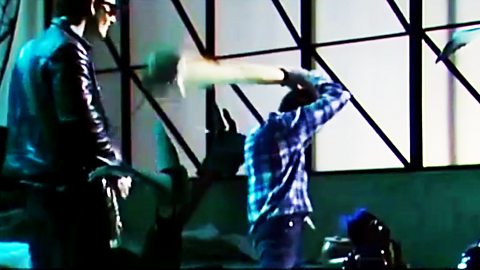
McGee & Gillespie: Causing a riot
Alan McGee & Bobby Gillespie on The Jesus & Mary Chain, Primal Scream & pop excess
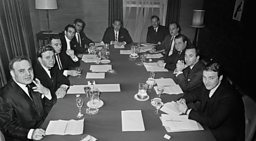
Epstein wanted to be friends with the band, and much of his approach was shared by Andrew Loog Oldham, who was the Beatles’ publicist before pitching the Rolling Stones as their antithesis.

As rock got bigger, so the manners of the managers grew cruder. Don Arden’s friends called him 'the Al Capone of pop', and aside from swindling the Small Faces out of their royalties, he is best known for dangling rival manager Robert Stigwood from his office window.
After much argy-bargy, Arden added Black Sabbath to his roster (‘there was guns, all kinds of shit,” Ozzy Osbourne recalls), though their affairs were ultimately tended to by his daughter Sharon, who also became Mrs Osbourne.
Led Zeppelin manager Peter Grant was equally menacing, and more successful.
Influenced by Colonel Tom, Grant limited the exposure of his group. Zeppelin did very little television, and released no singles.
Music Moguls: Don Arden

Sharon and Ozzy Osbourne tell the tale of the battle over Black Sabbath’s management
They explain how Arden had his sights set on managing Black Sabbath.
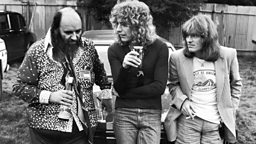
Simultaneously, Grant was turning the screw on concert promoters, making sure he, and the group, got the cash.
Peter Grant was a thug, but he was a thug on their behalfSimon Napier-Bell on Led Zeppelin's manager
“He was a thug,” Napier-Bell notes, “but he was a thug on their behalf.”
As manager of Wham!, Napier-Bell also borrowed from the Colonel Tom playbook.
Aloha From Hawaii had been inspired by President Nixon’s visit to China; Napier-Bell understood the marketing value of a show at the People's Gymnasium in Beijing.
With music now established as a global industry, perhaps the days of the personality manager are gone.
Still, you have to admire the hucksterism of Scooter Braun, who identified the potential of the 12 year-old Justin Beiber from a YouTube clip, and Jon Landau, the critic / fan who nursed Bruce Springsteen from clubs to stadiums.
These days, according to Bono, “the most important person in music” is Arthur Fogel of Live Nation, who keeps the turnstiles turning for U2, Madonna, Lady Gaga, the Rolling Stones and Neil Young.
Fogel’s interviews are full of jargon about assets and markets and global footprints. That may seem bland, but it’s where we are.
Taking care of business just got more businesslike.
Beginning with Money Makers, all three episodes of the Music Moguls series will be broadcast consecutively on BBC Four on Friday 05 August from 21:10 and available afterwards on BBC iPlayer.
This article was originally published on 15 January 2016 to coincide with the original broadcast of the Music Moguls series.
Music Moguls: Scooter Braun

How manager Scooter Braun discovered ‘Gangnam Style’ – and brought it to worldwide fame
Manager Scooter Braun on how he first discovered ‘Gangnam Style’.
The men who made The Who
-
![]()
Lambert & Stamp
Kit Lambert and Chris Stamp discovered, filmed and inspired The Who.
Music Moguls | BBC Arts features
-
![]()
Exclusives collection
Exclusive films and features to accompany Music Moguls, the secret story of pop and rock from the greatest producers, managers and PR giants.
-
![]()
Svengalis & thugs
How rock's greatest managers take care of business. Plus extras featuring The Jesus & Mary Chain and The Who.
-
![]()
They're called Hitmakers...
But what the hell do music producers DO? Leading producers reveal all. Includes extras with Tony Visconti and Lee Perry.
-
![]()
5 ways to the top
Alan Edwards, PR guru and presenter of Music Moguls: Myth Makers, delivers his five point plan for pop stardom.
Music Moguls | BBC Four & BBC iPlayer
-
![]()
Money Makers
Part one looks at the maverick managers who controlled the careers of megastar artists. Watch now on BBC iPlayer.
-
![]()
Melody Makers
Part two looks at the producers, from Trevor Horn and Lamont Dozier to Tony Visconti. Watch now on BBC iPlayer.
-
![]()
Myth Makers
Part three looks at PR, the unseen force behind the biggest musical acts in the world. Watch now on BBC iPlayer.
More from BBC Arts
-
![]()
Picasso’s ex-factor
Who are the six women who shaped his life and work?
-
![]()
Quiz: Picasso or pixel?
Can you separate the AI fakes from genuine paintings by Pablo Picasso?
-
![]()
Frida: Fiery, fierce and passionate
The extraordinary life of Mexican artist Frida Kahlo, in her own words
-
![]()
Proms 2023: The best bits
From Yuja Wang to Northern Soul, handpicked stand-out moments from this year's Proms












